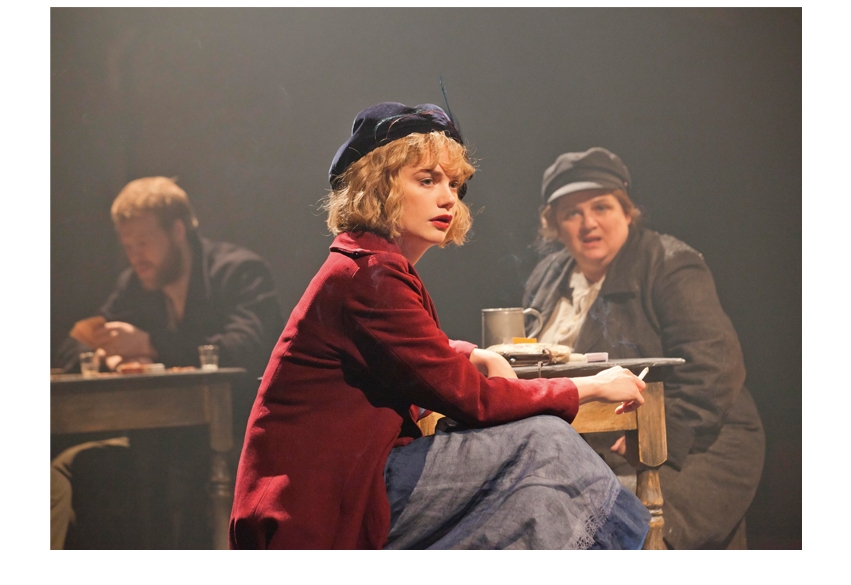Anna Christie, an early Eugene O’Neill play, has brought Jude Law to the tiny Donmar Warehouse. Set in New York among migrant longshoremen, the script takes ages to get to the point. Mat Burke, a randy Oirish loon, wants to marry Anna, a winsome worldly blonde, but faces opposition from her narky, knife-wielding dad, Chris.
But never mind the drama, listen to the accents. Jarring phonetics dominate the stage. David Hayman’s Chris spits out gnarled Scandinavian curses. ‘I svair to Gott, Anna, I don’t font hear it.’ Ruth Wilson’s Anna has a hard-to-place American accent which harbours many a stowaway syllable. And Law, playing de Oirishman, speaks a dialect that’s packed with extra fruity flavours. ‘Me ole bucko’ is his habitual salutation. On meeting Anna he attempts to seduce her thus. ‘’Tis one kiss oim needn to take de toiredness from me boans.’ In reply she asks if he has ever pursued the agrarian career of his countrymen. ‘Pah!’ he snorts. ‘Diggin de spods in de mod from dawn till dork!’
Law’s athleticism is magnificent. And he has no trouble finding the character’s homicidal aggression. Every twitch, every shudder, every jerk of every sinew is saturated with anger. He rips off his shirt, flexes his muscles and roars around the stage bellowing like a psychopath. It’s a nice treat for London’s ladyfolk, and gayfolk, who can savour the sculpted musculature of his undulating torso. And it’s easy to see why he accepted the part. ‘’Twas de rage and de woildness ripping troo me soul, so ’twas.’ But there’s less here for Ruth Wilson in the beige role of Anna (who nurses a tragic secret which the programme notes helpfully reveal).
Rob Ashford’s good-looking production compensates for the dramatic shortcomings with a lavish design. Act II opens with a set-piece hurricane. Crashing thunder. Glaring flashlights. Swirling spray. And, now, please, cue the sprinkler system. It should be impressive but it feels a bit ‘indoors’. And it’s hard to suppress the suspicion that all you’re experiencing is a power-shower, a few baby spots and a cloudburst taken from a sound archive. Ultimately, what keeps the play from greatness is O’Neill’s grasp of personality. His characters are so inflated and grandiloquently hysterical that you start to question your sympathies for them.
At the Trafalgar Studio there’s a revival of Caryl Churchill’s 1982 classic Top Girls. The script is an articulate muddle. It begins with a group of figures from history bitching about men at a posh modern restaurant. We meet an abused geisha girl, a peasant from a Brueghel painting, and the gender-bending Cardinal Joan who became pope in the 9th century. Joan is highly eloquent as she discusses the neoplatonic distinctions between matter and essence. The peasant is preverbal and swills down buckets of brandy while emitting resentful honks and grunts.
These polarities embody Churchill’s conception of women. They’re alpha or omega. Bright, thrusting winners or whining, dispossessed drudges. Though she’s adroit at rhetoric she isn’t a dramatist. She dumps her characters into a scene without a predicament or a storyline so the text has no dynamism, no forward movement, no tug of expectation. The scene ends pointlessly with a drunken bunfight.
Then we switch to a whizzy London recruitment agency where the female boss is visited by her runaway niece, a ‘thick, lazy, frightened’ teenager from Suffolk. Nothing happens here either but, as in the previous scene, there’s much carping about heartless men taking advantage of suffering, saintly women. But now the women have power. When a male character is passed over for promotion in favour of a woman he has a nervous breakdown and a heart attack. Even 30 years ago this was a laughable distortion. Men aren’t appalled by successful women. Men love them. They have more interesting things to talk about than babycare. And they pay for dinner as well. In return we merely have to deliver the ‘I’m a feminist too’ mantra which, we’ve learned, is more than a political commitment. It’s an aphrodisiac.
Much of Churchill’s dialogue is lost in Max Stafford-Clark’s production because the performers are required to shout over each other. This is naturalistic, of course, but theatrically self-defeating. It’s a complete waste of the actors’ talent and effort if their words are made unintelligible by a director’s whimsical blunders.
The good news is that there’s a knockout performance from Suranne Jones as a thrusting boardroom empress. And Olivia Poulet is excellent playing a selection of doormats and dimwits. Churchill, who was born in 1938, has a strangely trite and doctrinaire view of women. If she could draw them more realistically, and learn to shape a plot, she might one day write a play.







Comments